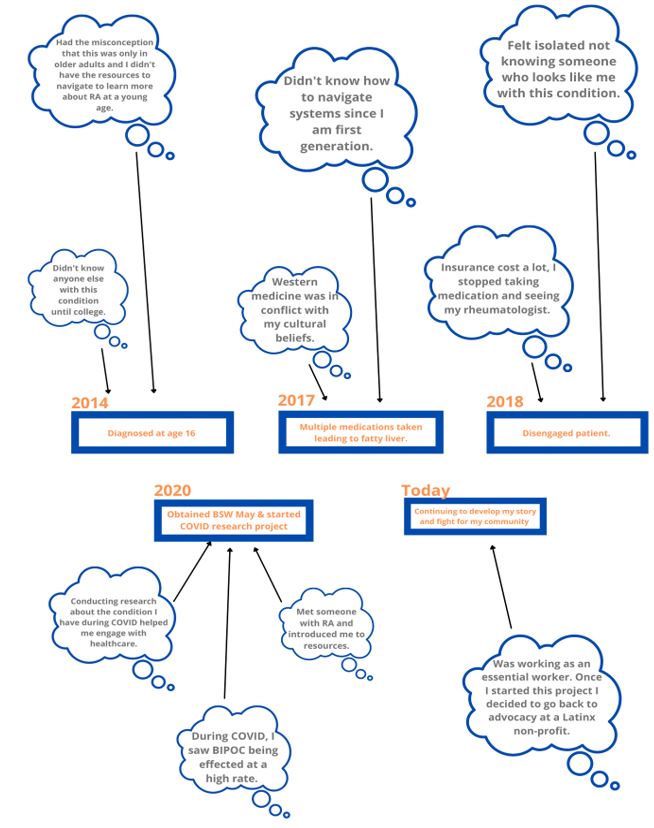Session Information
Date: Sunday, November 7, 2021
Session Type: Patient Perspectives
Session Time: 4:00PM-4:15PM
Background/Purpose: I am a 23-year-old first generation Latina with rheumatoid arthritis (RA). Despite being disproportionately affected by rheumatic conditions, the perspectives of Latinx remain poorly understood by rheumatology professionals and as such, we are more likely to experience negative health outcomes. I have spent years disengaged with my healthcare, without health insurance or a rheumatology provider. Western medicine and my culture’s beliefs are often in conflict. Because I was poorly educated about my disease, I tried so many medications that I was diagnosed with fatty liver disease in 2017. I have felt isolated, without community or support since being diagnosed at 16.
Intervention: In 2020, I was approached by a team of researchers, who also have arthritis, to work as a patient-researcher on a qualitative research project about people’s experiences living with rheumatic conditions during the COVID-19 pandemic. This project purposefully recruited Black, Indigenous, People of Color (BIPOC) and others from underrepresented communities. I was excited to bring my unique perspective and expertise and to ensure that Spanish-speaking populations were included. From the news and personal experience, I knew that BIPOC, specifically Latinx, were being hit the hardest by COVID-19 because many were classified as essential workers. Serving as a critical research team member allowed me to practice patient advocacy in the planning, recruitment, data collection, analysis, and dissemination of this project.
Maintenance: Collaborating in this research has helped me build connections with other rheumatology patients, increase my health knowledge, and better manage my mental health during the pandemic. During analysis with the research team, for the first time, I processed my own illness story including the opportunities and barriers that I have faced. In interactions with study participants, I listened to how others were coping and decreasing their risk to COVID-19, which lessened my anxiety as an essential worker and a Person of Color with RA. I also reflected on my own education and personal and professional skills, and felt empowered to help members of my community who continue to lack key health information. These experiences culminated in me fighting to obtain the care I deserve; although it’s been years since I last saw my rheumatologist, I am in the process of obtaining health insurance and follow-up care.
Quality of Life: Before this project, I was not an activated patient, nor did I know what I wanted to do after graduating college. Being part of a team of patient-researchers has allowed me to talk about my illness story-in-progress for the first time. I am now actively reflecting on what my role is as a young advocate. This project has shown me how multiple factors (e.g. government response, medical response and cultural/linguistic response) are not in favor of BIPOC and how it affects our financial wellness and physical, mental/emotional, and social health. These lessons have led me to change career paths and work for a Latinx non-profit, and I am reinvigorated to utilize my expertise as a first-generation Latina with a rheumatic condition to fight for my own health as well as for health equity in my community.
 Figure 1. Patient timeline from pediatric diagnosis to adult re-engagement
Figure 1. Patient timeline from pediatric diagnosis to adult re-engagement
To cite this abstract in AMA style:
Torres G, Wells C, Carandang K. Fighting for the Care We Deserve: My Experience as a Latina Patient-Researcher During the COVID-19 Pandemic [abstract]. Arthritis Rheumatol. 2021; 73 (suppl 9). https://acrabstracts.org/abstract/fighting-for-the-care-we-deserve-my-experience-as-a-latina-patient-researcher-during-the-covid-19-pandemic/. Accessed .« Back to ACR Convergence 2021
ACR Meeting Abstracts - https://acrabstracts.org/abstract/fighting-for-the-care-we-deserve-my-experience-as-a-latina-patient-researcher-during-the-covid-19-pandemic/
